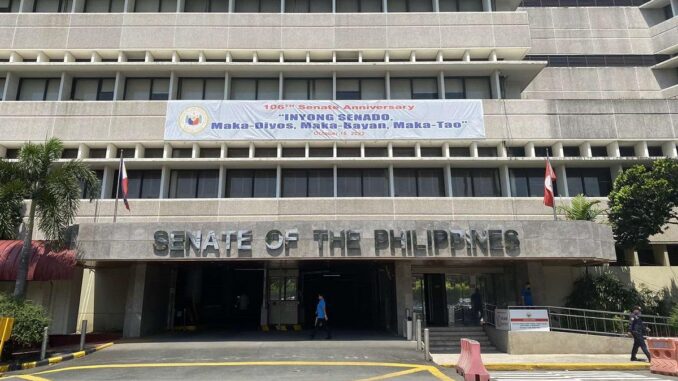
The Senate on Monday approved on third and final reading the bill seeking to develop the natural gas industry by revitalizing indigenous gas explorations and developing liquified natural gas (LNG) infrastructures.
Senate Bill 2793 garnered 14 affirmative votes, three negative votes, and zero abstention.
Senate Minority Leader Aquilino “Koko” Pimentel III, Deputy Minority Leader Risa Hontiveros, and Senator Sherwin Gatchalian voted against the passage of the measure.
Those absent during the approval of the critical measure were Senators Bong Go, Lito Lapid, Loren Legarda, Imee Marcos, Bong Revilla, and Mark Villar.
In explaining her vote, Hontiveros said that the bill might undermine the “least-cost” principle, which she said is a crucial safeguard for Filipino consumers against unreasonable prices.
She explained that the bill proposed that the “domestic natural gas sector will be under no pressure at all to match their selling price with what is available from regional and global markets.”
Despite this, Hontiveros said the Philippine energy sector is required to purchase everything that the sector will produce and even the most inefficient wells will be guaranteed a market.
“This abandonment of the ‘least cost’ principle may even affect, without categorically saying, the greatest potential of renewable energy to drive down electricity costs, especially when more and more investments are encouraged into this sector, rather than to another fossil industry which future is clearly defined in climate negotiations as a false solution and unsustainable,” she said.
She likewise opposed the “troubling” provision of the bill on cross-ownership after Senator Pia Cayetano, sponsor of the bill, rejected her suggestion to grant the Energy Regulatory Commission (ERC) the authority to determine cross-ownership limits for LNG facilities.
“This bill, in its current form, could perpetuate past mistakes in our energy sector. I urge my fellow senators to carefully consider these concerns as we proceed with this important legislation,” she said.
Gatchalian, vice-chairperson of the Senate energy committee, also opposed the passage of the bill due to the provision of the bill on prioritizing the indigenous natural gas over conventional energy sources.
“This means that even if power from other conventional energy sources will have a lower bid in the wholesale electricity spot market than power from indigenous natural gas, the latter will still be prioritized. This will push up spot prices, thereby placing the burden of higher prices on consumers,” Gatchalian said.
Secondly, Gatchalian expressed concern over the absence of a competitive bidding or price discovery mechanisms for the procurement of indigenous natural gas.
“Without this essential process, there is no concrete assurance that consumers will pay the lowest price, and investors will render the most efficient service,” he said.
“A mandated offtake for indigenous gas without competitive bidding or price discovery, would allow indigenous gas suppliers to set prices without restriction, potentially resulting in higher costs passed on to consumers,” he added.
He further stated that this could lead to increases in electricity rates as consumers are required to buy electricity from gas power plants who are in turn required to buy indigenous gas.
“Our responsibility to the Filipino people is to protect their interests and to act as guardians of consumer welfare. For these reasons, and with the goal of ensuring a fair and balanced energy market that puts consumers first, I cast my ‘no’ vote on this bill,” he said.
Cayetano, sponsor of the bill as chairperson of the Senate energy committee, refuted the concerns raised by her colleagues, particularly on the possible additional cost on consumers.
“To be very, very clear, we have price mechanisms. We have transparency. The law is very clear about fair and open access. Hindi po totoo na hindi po malalaman ang presyo. Hindi po totoo na ipipilit sa mga consumers ang mamahaling presyo. Ilang beses ko pong pinakita sa chart sa ating mga kababayan at sa ating mga kasama na historically napakababa nga ng presyo ng indigenous gas,” Cayetano said.
( It’s simply not true that the price will not be disclosed. It’s not true that consumers will be forced to pay high prices. I’ve shown this on the chart many times to our fellow citizens and our colleagues, and historically, the price of indigenous gas has been extremely low.)
“Kaya ‘wag po natin takutin ang ating mga kababayan na by prioritizing indigenous gas eh magmamahal. Hindi po totoo ‘yun. What I also like to emphasize na currently, ang mga power plants nag-ne-negotiate ng kung anong presyo nila na bibilhan ‘yung fuel supply nila. Wala hong bidding. So wala po akong pinapalitan hindi ko po tinatanggalan ng bidding kasi wala pong bidding sa level na ‘yun. Negotiated po yun. Those are supply agreements. Ganun pa rin. Same ang patakaran. Fair and open access to all the information available,” she added.
(Let’s not scare our countrymen that electricity costs will increase if we prioritize indigenous gas. That’s not true. What I’d also like to emphasize is that currently, power plants are negotiating the prices of their fuel supplies. I’m not replacing or removing anything from the bidding process, because there is no bidding at that level. Those are negotiated supply agreements, and that’s the same policy. It’s fair and open access to all available information.)
While she clarified the concerns of her colleagues, Cayetano maintained that the bill is a “momentous step forward” in achieving energy security and sustainable economic growth. — RSJ, GMA Integrated News





Be the first to comment